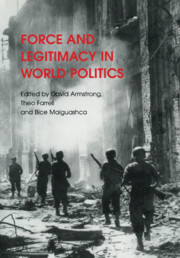Book contents
- Frontmatter
- Contents
- Notes on contributors
- Introduction
- 1 Legitimacy and the use of force: can the circle be squared?
- 2 Legality and legitimacy: the quest for principled flexibility and restraint
- 3 Not yet havoc: geopolitical change and the international rules on military force
- 4 Liberal hierarchy and the licence to use force
- 5 The age of liberal wars
- 6 Force, legitimacy, success and Iraq
- 7 War and international relations: a military historical perspective on force and legitimacy
- 8 The judgement of war: on the idea of legitimate force in world politics
- 9 Discourses of difference: civilians, combatants and compliance with the laws of wars
- 10 Fights about rules: the role of efficacy and power in changing multilateralism
- 11 Peacekeeping and enforcement action in Africa: the role of Europe and the obligations of multilateralism
- 12 Identity, legitimacy and the use of military force: Russia's Great Power identities and military intervention in Abkhazia
- 13 Dead or alive: American vengeance goes global
- Index
4 - Liberal hierarchy and the licence to use force
Published online by Cambridge University Press: 06 July 2010
- Frontmatter
- Contents
- Notes on contributors
- Introduction
- 1 Legitimacy and the use of force: can the circle be squared?
- 2 Legality and legitimacy: the quest for principled flexibility and restraint
- 3 Not yet havoc: geopolitical change and the international rules on military force
- 4 Liberal hierarchy and the licence to use force
- 5 The age of liberal wars
- 6 Force, legitimacy, success and Iraq
- 7 War and international relations: a military historical perspective on force and legitimacy
- 8 The judgement of war: on the idea of legitimate force in world politics
- 9 Discourses of difference: civilians, combatants and compliance with the laws of wars
- 10 Fights about rules: the role of efficacy and power in changing multilateralism
- 11 Peacekeeping and enforcement action in Africa: the role of Europe and the obligations of multilateralism
- 12 Identity, legitimacy and the use of military force: Russia's Great Power identities and military intervention in Abkhazia
- 13 Dead or alive: American vengeance goes global
- Index
Summary
Introduction
Determining when states can use force legitimately is the central normative problematic in world politics. Domestically, constraining the state's use of force with social and legal norms that confine state-sanctioned violence to a limited and clearly defined set of purposes and circumstances is essential to the maintenance of civil society and the protection of basic human rights. Internationally, circumscribing the conditions under which states may use force legitimately is critical to the maintenance of peace and stability in international society. And the degree to which legitimate force may be used internationally to constrain illegitimate force domestically lies at the heart of the problematic relationship between order and justice in world politics.
Ever so gradually, through the trials of war and colonialism, a set of principles have evolved internationally to govern when states may use force legitimately. First, recognised sovereign states are held to be legal equals, even if differences in capabilities are profound and certain institutional accommodations have been made to placate great powers. Second, sovereign equality gives all states a basket of governance rights internationally – enshrined in the general principle (if not in practice) of ‘one state, one vote’ – and rights of autonomy domestically, most notably the paired rights of self-determination and non-intervention. Third, to uphold these sovereign rights, the international use of force has been severely circumscribed. States may only use force in their relations with one another if (1) they are acting in self-defence, or (2) they are acting collectively to uphold international peace and security. Finally, in situations other than self-defence, decisions to use force must be made multilaterally through the Security Council of the United Nations.
- Type
- Chapter
- Information
- Force and Legitimacy in World Politics , pp. 71 - 92Publisher: Cambridge University PressPrint publication year: 2006
- 1
- Cited by



